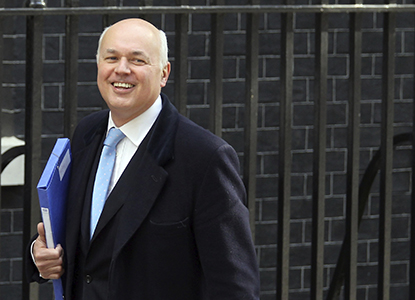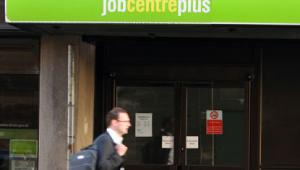By Richard Johnstone | 11 August 2014
Iain Duncan Smith will today defend the government’s welfare reforms by insisting that measures including the introduction of a £26,000 benefit cap are ensuring a ‘social recovery’ in the UK alongside an economic one.

The work and pensions secretary will say the coalition’s changes, which also include the introduction of the so-called bedroom tax, are helping people who had been ‘left on the sidelines’ back into work.
When the government came to power in May 2010, there were almost 2.5 million people unemployed and nearly 5 million people claiming a range of out-of-work benefits, Duncan Smith will highlight in a speech in London.
‘It was clear to me that in large part this situation was the product of a dysfunctional welfare system that often trapped those it was supposed to help in cycles of worklessness and dependency.
‘My one aim as work and pensions secretary has been to change this culture – and everything we have done, every programme we have introduced, has been about supporting everyone who is able to into work.’
The scale of change instigated by the government has been ‘enormous’, he is expected to say, but the policies – which also include the controversial merger of benefits into a single Universal Credit – were changing the country for the better. The number of people unemployed is now just over 2.1 million, and there are record numbers of people in work, he will say.
However, responding to Duncan Smith’s comments ahead of the speech, Labour’s shadow work and pensions secretary Rachel Reeves said the Universal Credit reform was ‘in chaos’.
MPs have warned that the rollout of the benefit reform is at risk due to problems with the computer system needed to implement it, and Duncan Smith has already admitted it was unlikely to be in place by 2017 as planned.
‘David Cameron’s government has failed to control social security spending and is set to overspend on welfare by a staggering £13bn,’ Reeves said.
‘The government’s flagship welfare reforms are in chaos. Millions of taxpayers’ money has been wasted on the £12.8bn Universal Credit which less than 7,000 people are claiming.’
Also today, the Policy Exchange think-tank has called for the level of the benefit cap outside London and the South East to be cut as part of efforts to further reduce welfare spending.
Chancellor George Osborne has said £12bn of further cuts from the welfare budget will be needed after the next election.
The think-tank said one way to make savings was to reduce the level of the cap by 10% to £23,400 outside the southeast of England, where the cost of living is lower, saving around £100m a year.
Steve Hughes, the think-tank’s deputy head of economics and social policy, said this would reflect different income levels and housing costs across the UK.
‘Policymakers have been looking for ways that this can be recognised within the welfare system,’ he said.
‘Setting one benefit cap for the high-income regions of London and the Southeast, and one for the lower income areas elsewhere, is a solution that avoids multiple rates across the country.’
Ahead of a full report later this month, which will set out how the next government could make the required savings, Policy Exchange also said child benefit payments should be capped at four children, with amounts cut after the first child. This could save as much as £1bn by 2020.




















